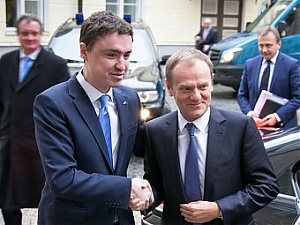Baltic States – CIS, Estonia, EU – Baltic States, Financial Services, Legislation, Technology
International Internet Magazine. Baltic States news & analytics
Sunday, 01.02.2026, 15:40
Rõivas and Tusk discussed the security and economic situation in Europe
 Print version
Print version |
|---|
| Taavi Rõivas and Donald Tusk. Tallinn, 9.01.2015. Photo: valitsus.ee |
“The European Union must remain true to its policies and not make any
compromises when it comes to sanctions, as long as the Minsk agreements are not
fulfilled and Crimea remains annexed,” Prime Minister Rõivas said. “United and
decisive Europe and good relations with the allies is the best strategy in
order to respond to the Russian aggression.”
Tusk also confirmed the importance of European solidarity in the fact that the
European Union must be united when it comes to protecting solidarity, freedom
and democracy. He emphasised that Europe will not make any compromises in
matters concerning the European Union’s fundamental values and security.
Rõivas, who will be heading to Ukraine and Georgia to a working visit on
Monday, noted that at the Eastern Partnership Summit taking place in Riga in
May, the European Union should lend a helping hand to its eastern partners by
supporting reforms and smoothing the path of those nations towards Europe.
“Estonia wants Georgia and Ukraine to achieve visa-free travel, since the two
countries have fulfilled all of the set preconditions. I would very much like
to hope that we would be able to provide a clear signal in May concerning
visa-free travel for Ukraine and Georgia,” said Rõivas.
While discussing economic matters, both Rõivas and Tusk confirmed that in the
interests of European sustainability, it is important to finally overcome the
economic and financial crisis. In their opinion, this requires more
investments, structural reforms, and holding a strict line when it comes to the
monetary policy of the Member States. “It is important that all Member States
fulfil their obligations. Estonia is a positive example to other Member States
in terms of its economic growth, balanced budget and low debt,” Tusk said.
Tusk, who will be visiting Lithuania next week, recognised the three Baltic
States for introducing the euro and added that at the unofficial meeting of the
European Council taking place in February, it is important to discuss the
questions concerning the management of the European Economic and Monetary Union
(EMU) and further developments in greater detail.
“A combination of the stability of public finance, investments in development
and structural reforms ensures the sustainability of the euro zone as well as
the economic well-being of its members,” Rõivas said. “On the development path
of the European Monetary Union it is important, first and foremost, to achieve
trust regarding the fulfilment of already established rules and assumed
commitments.”
Tusk also praised Estonia for its innovation, which is of critical importance
in revitalising the economy. “Estonia is a source of inspiration, being one of
the most innovative and technologically advanced democracies in the world, not
to mention the leader of digital development in the European Union,” Tusk said,
referring to the area of work of European Commission Vice-President for the
Digital Single Market Andrus Ansip. The President of the European Council
confirmed that the creation of the European Digital Single Market is a priority
for him, and Rõivas expressed hope that this would also be one of the topics of
Estonia’s Presidency of the Council of the European Union in 2018.
While discussing the Energy Union, Rõivas and Tusk agreed that it is of critical
importance for the citizens and companies of the European Union to have access
to affordable, secure and sustainable energy.
Referring to the forthcoming working period, both Prime Minister Rõivas and
President Tusk found that the European Energy Security Strategy, approved by
the EU heads of state and government at the June meeting of the European
Council, must be implemented by the institutions. Rõivas and Tusk also shared
the view that 2015 should see the completion of negotiations between the EU and
the USA over the Transatlantic Trade and Partnership Agreement.
Rõivas and Tusk condemned the terrorist attacks in Paris. “Terrorism is a
serious danger to European security and the values of our democratic society,”
the Prime Minister of Estonia said. Both confirmed that the terrorist act will
not break the unity and determination of Europe. Estonia, together with the
rest of Europe and the world, stands together with France in this tragedy.








 «The Baltic Course» Is Sold and Stays in Business!
«The Baltic Course» Is Sold and Stays in Business!

